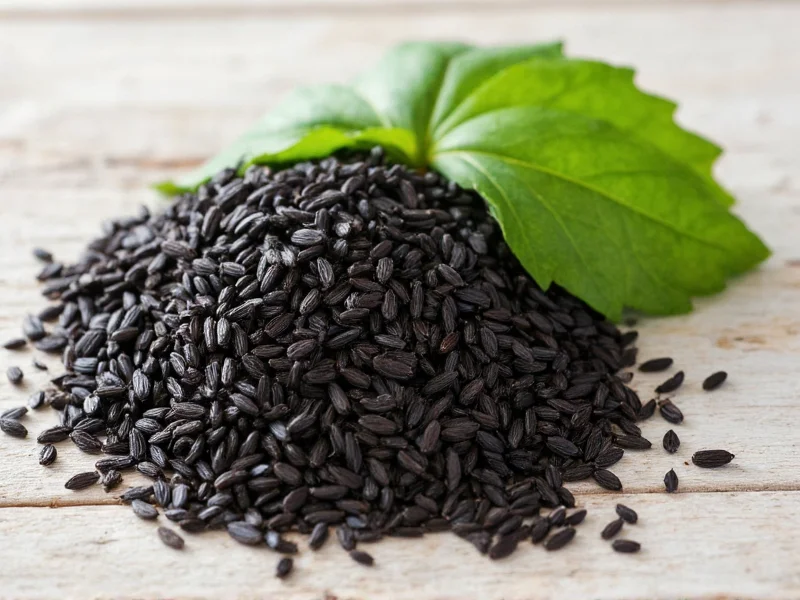Black licorice has been used medicinally for thousands of years across multiple traditional healing systems. This distinctive herb, derived from the root of Glycyrrhiza glabra, delivers a potent compound called glycyrrhizin that gives black licorice its characteristic sweet flavor and therapeutic properties. Unlike the candy version that often contains artificial flavors, true black licorice herb offers bioactive compounds that interact with human physiology in significant ways.
What Makes Black Licorice Herb Unique
The key differentiator of black licorice herb is its glycyrrhizin content, which is 30-50 times sweeter than sugar and responsible for most of its biological effects. This compound works by inhibiting the enzyme 11β-hydroxysteroid dehydrogenase, which affects cortisol metabolism in the body. Understanding natural black licorice root benefits requires examining both its traditional applications and modern scientific validation.
Traditional Medicinal Applications
Ancient Egyptian, Chinese, and Greek medical texts document black licorice herb uses for various conditions. Traditional applications include:
- Treating digestive disorders like ulcers and heartburn
- Alleviating respiratory conditions including coughs and bronchitis
- Reducing inflammation in skin conditions
- Supporting adrenal function during stress
These historical uses have prompted modern scientific investigation into the herb's potential therapeutic value.
Scientific Evidence on Black Licorice Benefits
Research supports several potential benefits of black licorice herb, though evidence quality varies:
| Potential Benefit | Research Status | Key Findings |
|---|---|---|
| Digestive Health | Strong evidence | Glycyrrhizin shows protective effects against H. pylori and gastric ulcers in multiple studies |
| Respiratory Support | Moderate evidence | Exhibits expectorant properties and may reduce cough frequency |
| Anti-inflammatory Effects | Preliminary evidence | Laboratory studies show inhibition of inflammatory pathways |
| Antiviral Properties | Emerging research | Potential activity against certain viruses including SARS-CoV |
Serious Health Risks of Black Licorice Consumption
The same glycyrrhizin that provides benefits also creates significant health concerns. The glycyrrhizin side effects stem from its effect on the renin-angiotensin-aldosterone system, which regulates blood pressure and electrolyte balance. Regular consumption of more than 100mg of glycyrrhizin daily (approximately 2 ounces of black licorice candy) can cause:
- Severe hypertension (high blood pressure)
- Hypokalemia (dangerously low potassium levels)
- Edema (fluid retention)
- Cardiac arrhythmias
- Metabolic alkalosis
The FDA specifically warns that people over 40 with heart disease or high blood pressure could experience irregular heart rhythm if they consume more than 2 ounces of black licorice daily for two weeks. These black licorice health risks make understanding safe consumption parameters essential.
Who Should Avoid Black Licorice Herb
Certain populations face elevated risks from black licorice consumption:
- Individuals with hypertension or cardiovascular conditions
- People taking medications for high blood pressure
- Those using corticosteroids or diuretics
- Pregnant women (may increase risk of preterm labor)
- People with kidney disease
- Individuals with low potassium levels
Even healthy individuals should limit continuous consumption to no more than 2-4 weeks according to most herbal medicine guidelines.
Safe Usage Guidelines for Black Licorice
For those considering black licorice root safe dosage, follow these evidence-based recommendations:
- Limited duration: Use for no longer than 4-6 weeks continuously
- Controlled dosage: Maximum 100-200mg glycyrrhizin daily (check product labels)
- Monitor potassium: Consider potassium testing during extended use
- Choose deglycyrrhizinated forms: DGL (deglycyrrhizinated licorice) provides digestive benefits without the risks
- Consult healthcare providers: Especially important if taking medications or managing health conditions
Black Licorice vs Regular Licorice: Understanding the Difference
Many consumers confuse black licorice vs regular licorice products. True black licorice contains actual licorice root extract, while many "licorice" candies use anise oil or other flavorings without glycyrrhizin. European regulations require products containing glycyrrhizin to carry warnings about excessive consumption, while US regulations are less stringent. Always check ingredient lists to determine if a product contains actual Glycyrrhiza glabra extract.
Conclusion: Balancing Benefits and Risks
Black licorice herb represents a classic example of the dual nature of many medicinal plants—they offer potential therapeutic benefits alongside significant risks. While research supports certain applications, particularly for digestive health, the black licorice consumption guidelines must be strictly followed to avoid serious health consequences. For most people seeking licorice benefits without the risks, deglycyrrhizinated licorice (DGL) provides a safer alternative for digestive support. As with any herbal remedy, informed, moderate use guided by reliable information remains essential for safe integration into wellness practices.
Frequently Asked Questions
How much black licorice is safe to consume daily?
The FDA recommends no more than 2 ounces of black licorice daily for people over 40, and even less for those with cardiovascular conditions. This equates to approximately 100mg of glycyrrhizin. Continuous consumption beyond two weeks increases risk of adverse effects regardless of age.
What are the first signs of black licorice overdose?
Early warning signs include headache, fatigue, muscle weakness, and irregular heartbeat. These symptoms often accompany elevated blood pressure and low potassium levels. If you experience these symptoms while consuming black licorice products, discontinue use immediately and consult a healthcare provider.
Is black licorice tea safe to drink regularly?
Black licorice tea contains variable amounts of glycyrrhizin depending on preparation. Occasional consumption (1-2 cups occasionally) is generally safe for healthy adults, but daily consumption for more than 2-3 weeks could lead to adverse effects. Those with hypertension or heart conditions should avoid regular consumption entirely.
Can black licorice interact with medications?
Yes, black licorice can dangerously interact with several medications including blood pressure medications, diuretics, corticosteroids, and blood thinners. The glycyrrhizin compound affects electrolyte balance and can amplify or diminish medication effects. Always consult your healthcare provider before combining black licorice products with prescription medications.
What's the difference between DGL and regular licorice supplements?
DGL (deglycyrrhizinated licorice) has had the glycyrrhizin compound removed, eliminating the blood pressure and potassium-related risks while retaining some digestive benefits. Regular licorice supplements contain glycyrrhizin and carry the associated health risks. DGL is generally considered safer for long-term use, particularly for digestive support.











 浙公网安备
33010002000092号
浙公网安备
33010002000092号 浙B2-20120091-4
浙B2-20120091-4